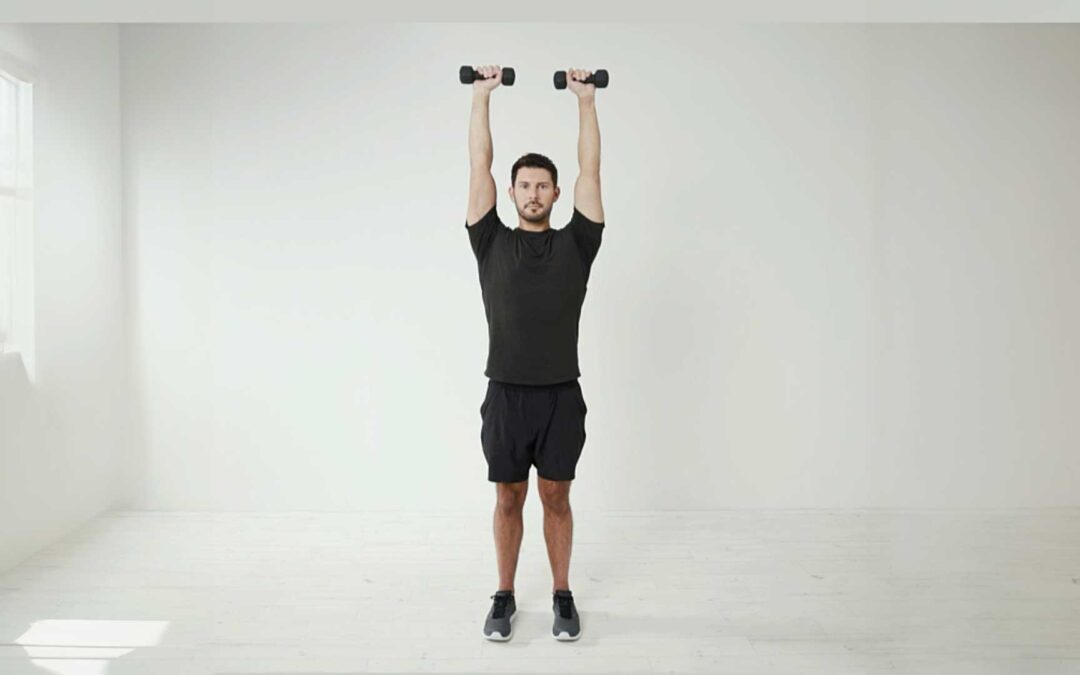What is a Weighted Shoulder Press?
The weighted shoulder press is a compound exercise that targets the shoulder muscles. During the movement, you hold a weighted barbell or dumbbells across your shoulders and press it until your arms are straight and your palms are facing forward or upwards. This exercise can be performed using bodyweight or free weights. It’s important to maintain proper form during the lift to avoid injury and maximize its intended benefits, which include increased upper body strength and muscle growth.
What are Benefits of the Weighted Shoulder Press?
The shoulder press exercise, also known as the overhead press, is a compound movement that primarily targets the deltoid muscles. It involves pressing a weight overhead while standing or sitting. The weight can be in the form of dumbbells, a barbell, or even resistance bands, depending on the individual’s fitness level and equipment availability.
The weighted shoulder press offers several benefits in shoulder physiotherapy:
- Shoulder muscle activation: The shoulder press targets the deltoid muscles, specifically the anterior and lateral heads. These muscles play a crucial role in shoulder abduction and flexion, making them essential for overall shoulder strength and stability.
- Improvement in range of motion: Performing the shoulder press through a full range of motion helps to improve shoulder flexibility and mobility. This can be particularly beneficial for individuals recovering from shoulder injuries or those with limited shoulder mobility.
- Functional movement patterns: The shoulder press closely mimics the movement patterns required for daily activities that involve overhead reaching or lifting. By incorporating the shoulder press into a physiotherapy routine, individuals can improve their ability to perform these functional movements with ease.
- Muscle balance and symmetry: The shoulder press helps to promote muscle balance and symmetry by targeting the deltoid muscles equally on both sides. This is important for maintaining proper shoulder alignment and reducing the risk of imbalances that can lead to injuries.
Now that we have a better understanding of the benefits of the shoulder press exercise in shoulder physiotherapy, let’s explore how to prepare for and execute this exercise effectively.
How to Perform Weighted Shoulder Press?
Let’s take a closer look at the Steps on how to perform weighted Shoulder Press properly:
- While standing, grasp your weights at shoulder height with elbows bent at a 90-degree angle.
- Ensure palms are facing forward and wrists are kept straight.
- Gently retract your shoulder blades downward and inward toward your waist to alleviate tension in the neck and shoulders.
- Extend your arms upward, lifting the weights directly over your head.
- Pause briefly at the conclusion of each movement before gradually lowering the weights.
- Emphasize lifting your arms in front rather than to the sides.
- Strive to bring your arms close to your ears when extending upward, maintaining proper posture by aligning your head with your spine.
- Prevent your shoulders from rising by consistently squeezing your shoulder blades down and inward.
- Avoid holding your breath during the exercise, and perform the movements within your comfortable range, considering advice from your physiotherapist.
- Complete the exercise based on your comfort level and pain tolerance, following guidance from your physiotherapist.
Tips for maintaining proper form and technique
To maintain proper form and technique during the shoulder press exercise, consider the following tips:
- Engage your core: Activate your core muscles throughout the exercise to maintain stability and proper body alignment.
- Keep your shoulders down: Avoid shrugging your shoulders towards your ears. Keep them down and away from your neck to engage the correct muscles.
- Focus on controlled movements: Perform the exercise with controlled movements, both while lifting and lowering the weights. This ensures that the targeted muscles are effectively engaged and reduces the risk of injury.
By being mindful of these tips and avoiding common mistakes, you can maintain proper form and technique during the shoulder press exercise. This will allow you to reap the maximum benefits of the exercise and minimize the risk of strain or injury.
Now that we have covered the importance of maintaining form and technique, let’s explore the recommended repetitions, sets, and progression for the shoulder press exercise.
Role of Merlin Physio in Performing Weighted Shoulder Press
Merlin Physio plays a crucial role in guiding and optimizing the performance of the Weighted Shoulder Press exercise. Here’s how:
- Form Correction:
- Merlin Physio assists in ensuring proper form during the exercise, emphasizing holding weights at shoulder height, elbows at a 90-degree angle, palms forward, and wrists straight.
- They help in correcting any deviations from the recommended posture to prevent injury and maximize the effectiveness of the workout.
- Muscle Activation:
- The physiotherapist ensures proper muscle activation by instructing clients to gently draw their shoulder blades down and inward, preventing unnecessary strain on the neck and shoulders.
- They guide individuals to focus on lifting the arms in front, not to the side, for targeted engagement of the shoulder muscles.
- Range of Motion Management:
- Merlin Physio helps in managing and optimizing the range of motion, ensuring that individuals extend their arms upward and lift weights directly above the head.
- They provide guidance on the appropriate pause at the end of each movement and a controlled return to avoid abrupt or improper motions.
- Posture Maintenance:
- Physiotherapists emphasize maintaining proper posture by keeping the head in line with the spine. This ensures a neutral spine position, reducing the risk of injury and promoting overall stability.
- Breathing Technique:
- Advising on proper breathing techniques is essential. Merlin Physio guides individuals to avoid holding their breath during the exercise, promoting consistent and controlled breathing for better oxygenation and endurance.
- Individualized Approach:
- Recognizing that each individual may have different needs or physical limitations, Merlin Physio tailors the exercise based on an individual’s capabilities, pain tolerance, and specific conditions.
- Injury Prevention:
- Physiotherapists play a crucial role in preventing injuries by monitoring for signs of overexertion, ensuring the avoidance of shoulder shrugging, and adjusting the exercise intensity according to the client’s condition.
- Rehabilitation Guidance:
- For individuals recovering from shoulder injuries, Merlin Physio provides guidance on how to adapt the exercise to support rehabilitation, gradually increasing intensity as the individual progresses.
In summary, Merlin Physio’s role in performing the Weighted Shoulder Press involves ensuring proper form, muscle activation, range of motion, posture, breathing technique, and individualized guidance, contributing to a safe and effective exercise routine tailored to the individual’s needs and capabilities.
Q & A
Q. Who can benefit from shoulder press with weights for shoulder physiotherapy?
Individuals recovering from shoulder injuries or seeking to strengthen their shoulder muscles can benefit.
Q. What if shoulder press with weights causes discomfort during physiotherapy?
Start with lighter weights, reduce range of motion, or consult with a physiotherapist to modify the exercise.
Q. How often should one incorporate shoulder press with weights into their shoulder physiotherapy routine?
It is recommended to start with 2-3 times per week, gradually increasing frequency based on individual progress.
Q. What other exercises can complement shoulder press with weights for shoulder physiotherapy?
Exercises like lateral raises, internal and external rotations, and scapular retractions can complement shoulder press for a well-rounded routine.

